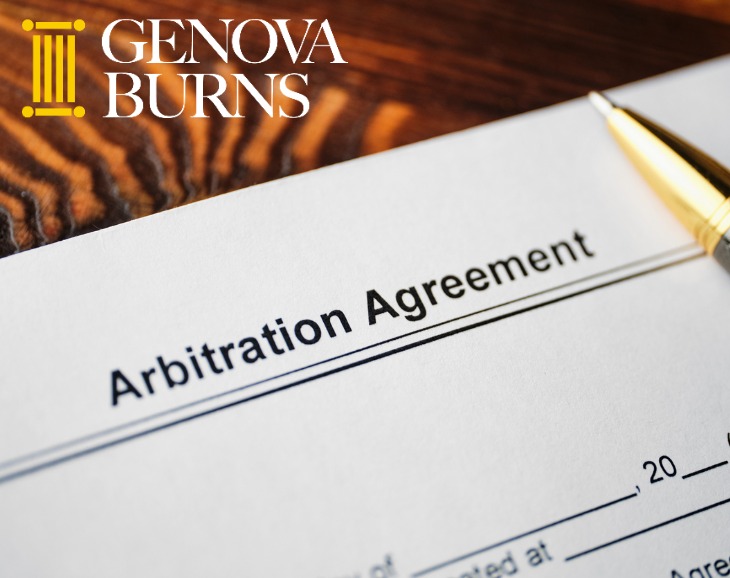Doubling Down on the FAA: NJ District Court Strikes Down the NJLAD’s Prohibition Against Arbitration
April 12, 2021
Earlier this year, in a matter of first impression, the Monmouth County Law Division in Janco v. Bay Ridge Automotive Management Corp. held that the amendment to the New Jersey Law Against Discrimination (NJLAD) which prohibits a waiver of any right or remedy available under the NJLAD was superseded by the Federal Arbitration Act (FAA). In its decision on March 25, 2021 in New Jersey Civil Justice Institute v. Grewal, the United States District Court followed suit and enjoined the State AG from enforcing Section 12.7 of the NJLAD that would invalidate arbitration agreements between employers and employees. This decision represents a significant victory for employers on the enforceability of arbitration agreements in harassment, discrimination and retaliation cases in New Jersey.
Facts
The New Jersey Civil Justice Institute and the United States Chamber of Commerce filed a complaint seeking a declaratory judgment by the District Court that Section 12.7 of the New Jersey Law Against Discrimination is preempted by the Federal Arbitration Act. The plaintiffs named the State Attorney General as a defendant and sought a ruling that would prohibit the State from enforcing that provision of the NJLAD as it applies to arbitration agreements in employment contracts.
The New Jersey Civil Justice Institute is a nonprofit group whose members include small businesses, business associations, and professional organizations. The Chamber of Commerce of the United States of America is a business federation that advocates on behalf of its members on matters of anti-business regulatory actions and federal arbitration law. Many of its members, some of whom operate in New Jersey, routinely enter into arbitration agreements with their employees.
Section 12.7 of the NJLAD prohibits the prospective waiver of any right afforded by the NJLAD, and further provides that any employment contract containing a provision that waives any right related to an employee’s claim of retaliation, discrimination or harassment is against public policy and unenforceable. Because one of the rights afforded by the NJLAD is the right to a jury trial, this amendment had the practical effect of invalidating arbitration agreements that required the employee to waive the right to a jury in favor of arbitration.
District Court Decision
The plaintiffs were first required to prove that they had standing to file the complaint seeking a declaratory judgment. Organizations cannot file a complaint merely on the basis of interest in a legal issue, but must demonstrate that the association’s members have suffered a direct injury as a result of the law or regulation they are challenging. Citing to federal precedent, the District Court explained that “[s]ufficient injury exists to confer standing where the regulation is directed at [the plaintiffs] in particular; it requires them to make significant changes in their everyday business practices; [and] if they fail to observe the…rule they are quite clearly exposed to the imposition of strong sanctions, even where there is no pending prosecution.”
The Court found that both plaintiffs established that they had standing to bring the suit because many of their corporate members had entered into pre-dispute arbitration agreements after the enactment of the NJLAD amendment. These companies are now faced with the threat of penalties for attempting to enforce these agreements, or having to make significant changes to their everyday business practices. The plaintiffs were also able to show that the organizations themselves were injured because they had expended considerable time and expense to challenge this amendment, to preserve their members’ access to alternate means of dispute resolution with their employees.
Following its determination that both plaintiffs had standing to challenge the amendment, the Court turned to the merits of the Complaint and found that the amendment to the NJLAD was in direct conflict with the FAA, which preempts and nullifies “state legislative attempts to undercut the enforceability of arbitration agreements.” The state statute did not need to specifically refer to arbitration agreements or the FAA; if its practical effect is to disfavor arbitration, it is preempted by the FAA. Section 12.7 of the NJLAD prohibits the waiver of any right afforded by the NJLAD, which includes “the right to file a complaint in the Superior Court to be heard before a jury.” Because arbitration agreements explicitly waive jury trials, this provision as applied would invalidate any such agreement. The Court found that the language in Section 12.7 directly contravenes the FAA and fails to put arbitration agreements on the same footing as other contracts and consequently, it is superseded by the FAA and rendered unenforceable.
Bottom Line
The federal court’s decision provides another clear sign to employers that arbitration agreements they execute with employees will be enforceable, and that any challenge to the validity of the agreement on the basis of Section 12.7 of the NJLAD will most likely fail. As noted with the first state court decision with the same result, should the State AG file an appeal, the Third Circuit Court of Appeals will have an opportunity to weigh in on this ruling issued by the lower court.
Employers are again reminded that they should take all appropriate steps in the drafting and review of arbitration agreements to ensure that the agreement is one that would indicate mutual assent by both parties to submit to arbitration as opposed to a jury trial.
For more information regarding this decision and best practices to implement an effective arbitration agreement for your workforce, please contact John C. Petrella, Esq., Chair of the firm’s Employment Law & Litigation Practice Group via email here or Counsel Erica M. Clifford, Esq. via email here or call 973-533-0777.
Tags: Genova Burns LLC • Erica M. Clifford • John C. Petrella • Employment Law & Litigation • Arbitration Agreement • FAA • NJLAD • New Jersey

